Investigate the issue of penalties 2.0
This material will be useful in the first place to those who have done a lot of programming and suddenly became forced to do project and people management. A year ago, I talked about the punishments at the conference, and the suns from Bitrix made a text version for #habr. Unfortunately, losing accuracy, clarity and accuracy of accents. For the year material added. At the end - checklist for lazy :)
So. If you are not a sadist or moral monster, and your employees are not masochists, then I doubt that any of you are being punished. I do not.

We will examine the fact of this phenomenon - punishment. I know the theme is reverent. It causes negative emotions, urges to burn the author, discourages the ability to read and analyze. But it includes a generator of stinging commentary stamps and minuses in karma. But here I will explore exactly (!!!) punishment. How scientists are researching a deadly virus: with practical interest, experimentation, and without making preliminary results.
Punishing is not taught anywhere: neither in business literature, nor at trainings, nor in universities. However, the phenomenon itself exists. Novice managers with little management experience are either unable to punish, or they do it awkwardly. Often suffer and accumulate complaints against employees until they bomb them - and then they get everything. The boss himself in this situation understands that he is wrong. But it has already suffered - there is no turning back.
')
It's sad, but how do you require a person to have a skill that he has not been taught anywhere? He was a programmer, became a manager, and then - go and punish? Is it wrong to demand from the programmer virtuoso hand-to-hand combat skills?
But an carelessly punished (and in fact offended) employee will not go into such details. Deal will have managers, managers, directors.
In punishment, high accuracy is important. It should be higher than in the distribution of rewards. The situation when the boss is in a festive mood, and on this occasion he gave the whole department a bonus, will be perceived normally. But if he punished everyone, because the tooth hurts - this will be treated differently.
I first thought about the measure of "responsibility" when Siberiks was small: a couple of developers and designers. For our sphere (and for many others at the start) it’s typical that the founder is able to do something with his hands: to program or design to draw. And, as a rule, loves this business.
It was already night. I was sitting in the office and debugging a piece of code behind a programmer who had thrown everything clearly and went home. At the same time, the customer pushed me on Skype, hurried, scolded me, tried to write in red.
And I sat, debugged and thought: what does it mean for a developer to be responsible for the project?
As a director, I understand that in the case of fakapa ogrebu in full. I will put the wrong people on the project - I will fail financially, an unsuitable employee for hire - there will be problems in the team. All responsibility of the company lies with me. What is the responsibility of the programmer? Or a designer? What is it in practical terms?
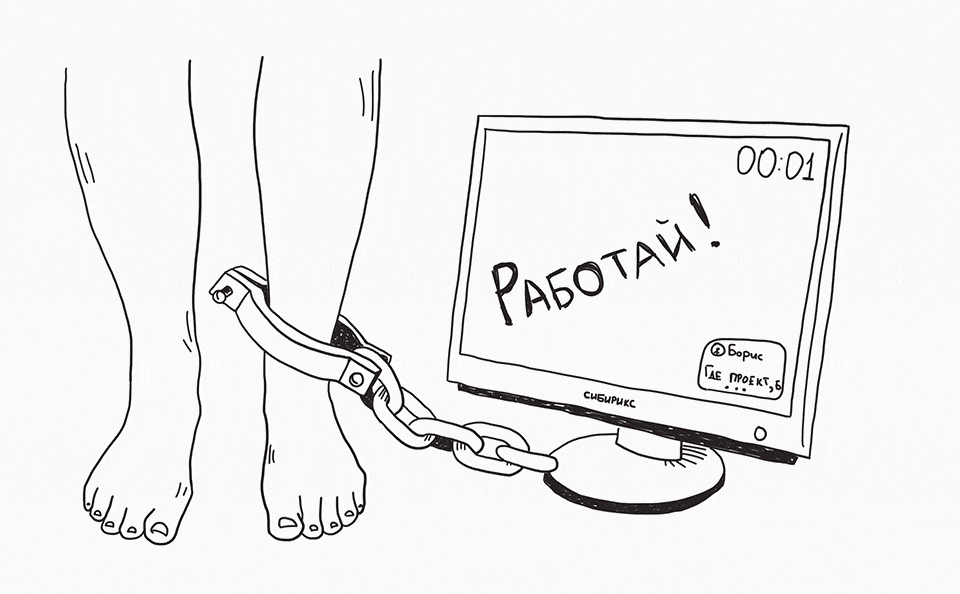
Serfdom was abolished, it is impossible to fine on TC. It’s impossible to work out during off-hours (yes, yes, good to overtime!), To beat - not; to handcuff to the battery is also prohibited. It turns out, you can only dismiss. But I already sit, work at night - I will sit without him until the morning. Invulnerable such chuvachki, it turns out.
And only years later, I found the answer to this question. And it came to be understood that the developer who had gone home on time, although he had not completed the task, was not to blame for anything. And I - yes, I am guilty and did something wrong: I crookedly built the workflow, planned out the time, or incorrectly shaped the expectations of the customer. However, young and ready-made mountains to roll the would-be leaders do not allow such a thought. They turn on the stereotype “Your work is not finished on time, and this brought me problems. You are guilty!"
A conversation on high tones with podchevkami and inserts from a large Petrovsky bend - the most accessible way for inexperienced managers to let off steam and give all the negative connection that has accumulated.
But when the reason for disassembly is a minor offense, it’s not very desirable to swear. It is simply irrational. And there is a scheme: the head closes his eyes to the shoals until their number reaches a critical mass in his perception. Then the lid of the teapot is torn off, the boiling water with whistles and splashes flies toward the subordinate, simultaneously covering another half of the office ... Bad circuit. Unworthy of adults and smart people.
Ok, scream and break loose. Are there alternatives? Yes, as many as you want!
Technology today allows the voice to not speak at all. Why, when you can write about everything! More than others, this variant is loved by introverts (and, as a rule, most of them in IT).
And they write: in Skype, on mail or in telegrams. And they are trying to convey to the employee what his jamb is and why in the future this cannot be repeated. Painted in colors and epithets moral problems and material consequences. And the details of what will be done with the person, if such garbage will repeat.
Introverts such a way of issuing feedback seems practical: it does not require emotion and personal involvement. And it is almost as usual as writing code (only commands are bigger and the syntax is richer).
The method works flawlessly. In 100% of cases, a person, after reading a message, does this:

Take a closer look at him. See, he mumbles? You know what? And this is what: “The boss is a goat. Office - shit. You do not hear this, but the labor market spreads far and for a long time does not fall silent.
Scribbling a malicious letter to a subordinate, you did not punish him, but offended him.
Between "punish" and "offend" the border is thin, and it is important to feel it. When you punish a person, he becomes aware of what is really to blame. And when you offend, he thinks that you are wrong. This is especially hard working in our IT environment, where there are a lot of smart people, with a high sense of their significance and a binary understanding of the beautiful.
From here - two important consequences. For intellectual workers:
In the English business literature there is nothing sensible about punishment. Only about motivation, corporate culture, good relations and win-win. In the ideal world that is described there, the manager created a motivating environment inside his company, and the employees either never lost their hands or (logically) get away with misconduct.
But there will definitely be shoals. And they will most likely be due to a violation of the agreements or an employee’s too creative attitude towards the rules. Our wide Russian soul loves it.
The problem is that if the offenses do not respond, they will be repeated more and more often. The authority of the manager will be undermined. Employees will begin to ignore the rules, regulations and arrangements. Performance will go to zero. The company will go broke, everyone will go home, the end. Joke :)

It turns out that it is still necessary to punish. But how? - Western books do not help with this issue. Domestic - also not really. Something similar to the truth is in A. Friedman. He examines different types of operating system management:
Our work is organized by scrum and agile and is more like regular management. In regular management there are two unclean and complex (no one said that being a leader is easy) principles:
1. The head is obliged to punish the subordinate if he violated the rules established and communicated to him.
Suppose the manager set the task for junior programmer Pete to design a database. And, as he is just learning, the manager asks Petya to call on the help of an experienced programmer Katya. Let him sit side by side, help-prompt.
Petya timidly approaches Katya, says: "Help me - the boss asks." And Katya has a spring wind in her head and a full “I don't want to think - I want a little dress”. And she gently sends Petya away, for she has no time.
There is nothing to do - Petya, in order not to screw up the task, read books and forums, dug up the Internet. He spent several evenings and eventually designed a really good base.
It seems that Petya did a good job: he pumped himself and completed the task. But in the system of regular management it must be punished. Like Katya, but with her, I think, everything is clear: she refused to perform the task. (My manager, by the way, is also under the gun - what does he put tasks not through Jira?, But then such a culture can ...).

And Petya went where he was not asked and violated an agreement with the leader — that’s what we need to punish. Although in the system of improvisational management, he may have accomplished the feat and deserves a medal (he satisfied the principle “it doesn't matter how, but on Monday morning it should be on my table!”).
The second rotten principle of regular management is as follows:
2. The head has no right to punish the subordinate if he acted without exceeding his authority.
This rule is even more complicated than the first: it requires a cold head, a firm hand, experience, thinking time and moral maturity from the leader.
Example from life: our system administrator changed the drives on the internal server. The procedure is simple, with strict rules, we do it every six months. But during the replacement there was an incomprehensible failure and all the data from the hard drive was dropped. It could be restored - which we did, but 42 people lost 4 hours of work.
The sysadmin did everything according to the instructions - so the manager has no right to punish him. Although very desirable. It is impossible to punish, but he must do everything to find out the reasons for the failure and spread the straws the next time.
In regular management, the manager is not obliged to punish the subordinate immediately, as the jamb remarked. You can respond after a while. Two or three days will not change the situation, but will help to sort out the question and develop a plan of action. For a longer period, you should not postpone - the employee can forget the details, and punishing something that the person does not remember is somehow not comme il faut.
The same thing - if you decide to dismiss an employee, but now he has an important project. You do not have to leave immediately - choose a convenient time for you.
There is no forgiveness procedure in management. The head is obliged to respond if the employee has violated the rules. But there is an amnesty procedure: if a person has pleaded guilty and repented, the manager is obliged to stop eating his brain.
Do not confuse amnesty with forgiveness.
Amnesty is not automatic and based on the principle of "you to me, I to you." If there is an agreement in the company that no one is late, but both the manager and the subordinate have violated it - the boss cannot be forgiven for the employee, just because he himself has a gun in the stigma. Punishing in this situation is still necessary. As a leader, he will punish himself — a separate topic that does not concern the subordinate. Either follow the rule, or remove it.
Amnesty is possible if people are willing to admit to misconduct even to themselves. In Japanese culture, there is the term hansei (反省) - literally “introspection”. It refers to the situation when a person analyzes his actions, feels shame and learns a lesson that it is impossible to do this and why. Hansei is a key principle of Toyota Subsidiary.
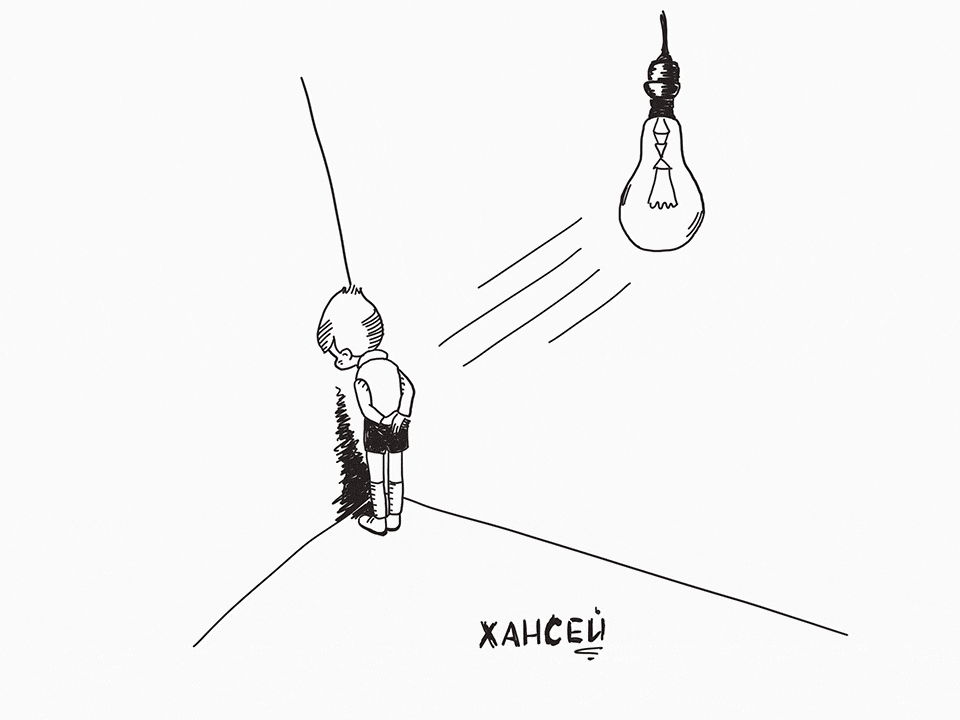
In our culture, such self-reflection is rare. But you can get something similar, if the guilty independently and sincerely carry out root cause analysis. We use it in difficult situations or at packs on projects. Below are two maps - for detailed and brief root cause analysis.
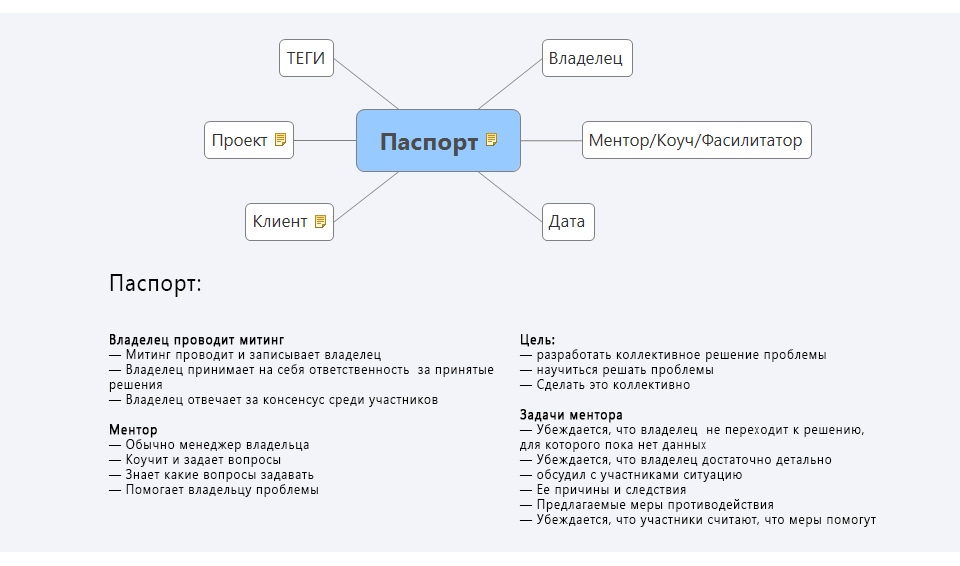
Hardcore version
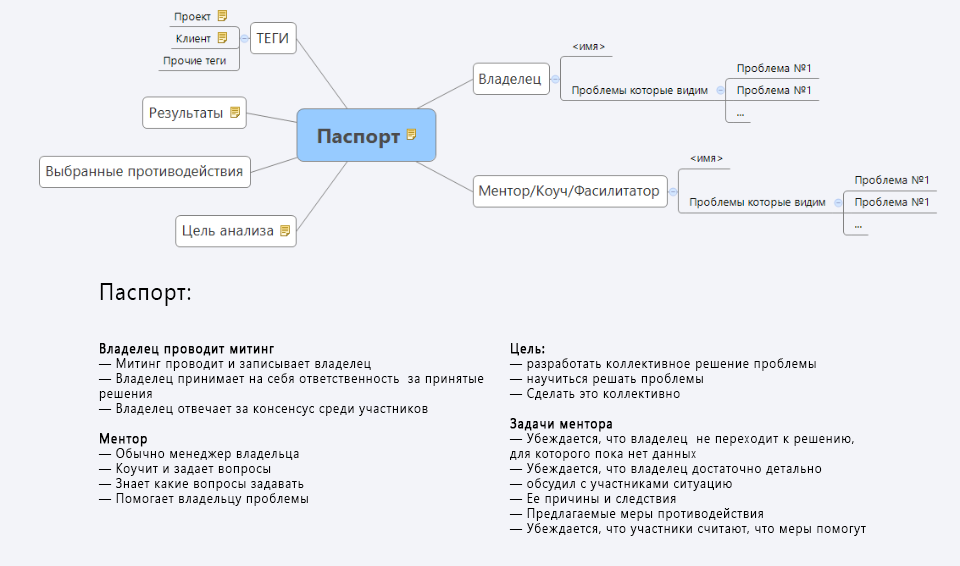
Soft version
Their essence is to immerse a person in the analysis of his actions and behavior, so that he finds flaws and jambs. According to the result - proposed measures to prevent a recurrence of the crisis in the future. Each completed card is necessarily discussed between the employee and the manager - to make sure that the analysis is carried out thoroughly, and the measures will help. The method requires a lot of time and effort, but is justified in difficult situations.
Root cause-analysis has a limitation - it works only with those employees who are willing to look for the causes of the problem in themselves, and not in the surrounding or circumstances. Such people are growing rapidly and such an analysis will only help them.
If you are interested in the topic of management and are not allergic to philosophy, read the books by V. K. Tarasov - this is a concentrate of thoughts. For example:
The head is like a fire. Unable to get close. Heat is near, but unbearably hot, if you try to get even closer.
In a properly organized company, a person feels comfortable next to the manager. And the punishment is to change this comfortable distance to another. Either the manager will bring the subordinate closer to himself, start asking uncomfortable questions, make him delve into himself, sweat and burn with shame. Or, on the contrary, it will repel a person right up to dismissal. Punishments are placed on these poles. And if a person behaves correctly, let him continue to sit at a comfortable distance.
Homework: after it, any novice leader will become stronger. Think about how ready you are to punish people: from the softest way to hardcore. The most hardcore is the dismissal. Arrange ways to increase cruelty. After you will have your arsenal. It is not necessary to apply punishments in practice, but it is not bad to have them available. It will make you stronger.
So, it is necessary to punish for offenses, and for the most part punishments lie in the moral plane. Correct punishment implies that the punished is aware of his guilt. But how to achieve this? Read morality? Bad idea - remember what you thought about when morality is being read to you: “How to keep a smile and not say something impudent” or “But when this reptile boss is already shut up”. In both cases, the authority of the manager falls, and the subordinate does not realize his guilt.
What you need to do is ask uncomfortable questions. Ask and wait for an answer. Do not allow to dodge or translate the topic. Your task is to ensure that the person sees the situation from the right angle. He will try to dodge, start inventing excuses or refer to the fact that "others do this, too." Do not be confused. Turn the person face to the mirror and make look. Additional techniques and techniques (voice, timbre, look, facial expressions, gestures, poses) will enhance the effect.
The mistake is to ask a question and not leave a pause for an answer to it, but immediately proceed to the reading of morality. Ask and be silent. If there is no answer - remind that you are waiting for it. Do not let yourself be confused and lead away into irrelevant details or unnecessary entities. Cut off the excess.
You need to punish only in private. In public, the employee can enter the role. This will undermine your authority if you do not have the skill and inner strength to besiege a person with one phrase. Well, it's just unpleasant. Our task is to change the pattern of employee behavior in the future, to make it better. Therefore, an unpleasant procedure for both parties should take place only in private.
Rules that violate employees are written, oral, and established by force of custom. And holes (such places that can be interpreted ambiguously) are in any regulation. If you do not believe, send me your time limit on the cognac dispute :)
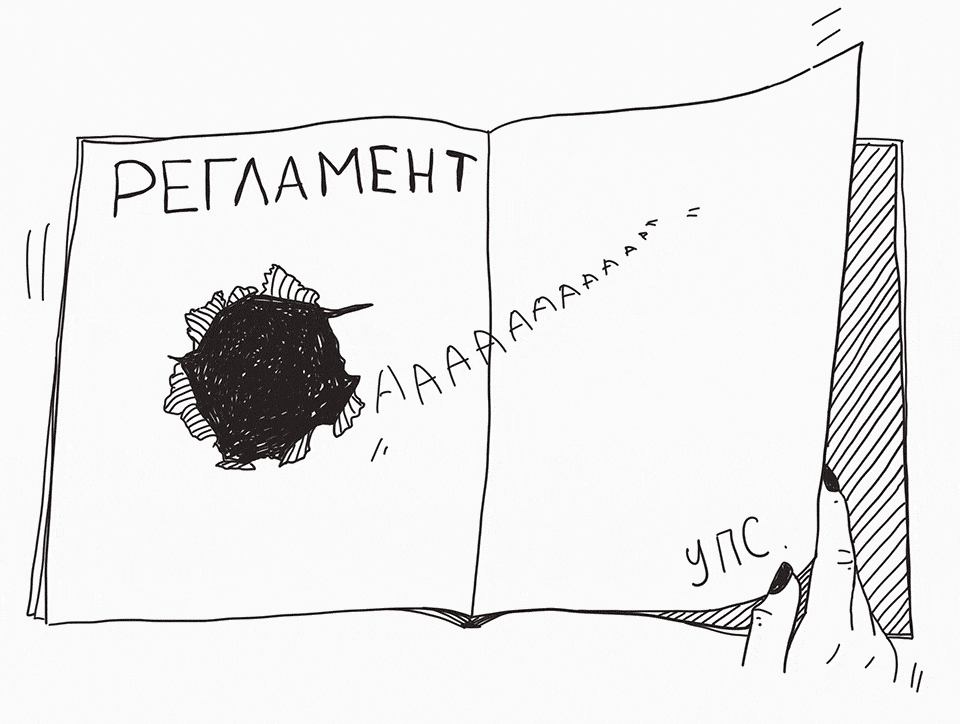
Most likely, the punishable will try to evade punishment, referring to the incompleteness of the regulations (“But it is not written anywhere that you can not dry the cat in the microwave!”). If you hear something like this, ask the person why he turned on the fool. If for the sake of excuse - ask to turn off and return to the discussion of misconduct. And if the fool is turned on systemically (or does not turn off) - ask yourself how this person passed the interview and why he still works in your company.
If an employee accumulates and does not reset karma - this is an unhealthy situation. The manipulative chief remembers all the misdemeanors of the subordinate and pokes them on the occasion and without, uses inductive wrap (the link is a great movie!) And generalizations.
If the situation with the misconduct of a subordinate is dismantled, it is no longer returned. The punishment is over. Karma is reset.
Even when you upgrade your punishment skill to level 90, their effectiveness may still be low.
The reason - the wrong dosage. Penalties should be 5-6 times less than rewards. If employees know that there could be no punishment, this is a strong motivation to be more careful in the future. And, on the contrary, if they are accustomed to having a blow on the ridge for each “well done”, they continue to do as before - after all, with a probability of 50%, they will arrive anyway.
Good about punishment and motivation is written here .
Sometimes in groups there are people who can not be punished. In the case of a shoal, they torture themselves so that you do not add anything from outside. These are very responsible people. They are quickly corrected and grow - it is a pleasure to work with them. And they should not be punished.

We found out that accuracy is important in names. To do this, you need to pump yourself in many areas: ask short and correct questions, get to the bottom of the truth, control your voice, look, gestures, facial expressions. It will take a lot of time and training. But on whom?
If it dawned on you with a brilliant idea - to practice at home - please do not do so. Your family is not to blame for what you are reading :)
Technique can work on those who do not mind - no matter how cynical. In the end, fewer people will suffer than you offend, punishing you for years without training and practice.
At first you will not succeed: most likely, slide into reading morality. But over time, learn to pick up punishments commensurate with the jamb, to lead the employee in the dialogue to the realization of misconduct, and all this - putting emotions in the background.
Instead of withdrawing, keep a checklist for self-control, where everything that you learned about the punishment is collected in short paragraphs. Successes!

So. If you are not a sadist or moral monster, and your employees are not masochists, then I doubt that any of you are being punished. I do not.

We will examine the fact of this phenomenon - punishment. I know the theme is reverent. It causes negative emotions, urges to burn the author, discourages the ability to read and analyze. But it includes a generator of stinging commentary stamps and minuses in karma. But here I will explore exactly (!!!) punishment. How scientists are researching a deadly virus: with practical interest, experimentation, and without making preliminary results.
Punishing is not taught anywhere: neither in business literature, nor at trainings, nor in universities. However, the phenomenon itself exists. Novice managers with little management experience are either unable to punish, or they do it awkwardly. Often suffer and accumulate complaints against employees until they bomb them - and then they get everything. The boss himself in this situation understands that he is wrong. But it has already suffered - there is no turning back.
')
It's sad, but how do you require a person to have a skill that he has not been taught anywhere? He was a programmer, became a manager, and then - go and punish? Is it wrong to demand from the programmer virtuoso hand-to-hand combat skills?
But an carelessly punished (and in fact offended) employee will not go into such details. Deal will have managers, managers, directors.
In punishment, high accuracy is important. It should be higher than in the distribution of rewards. The situation when the boss is in a festive mood, and on this occasion he gave the whole department a bonus, will be perceived normally. But if he punished everyone, because the tooth hurts - this will be treated differently.
"To be responsible" in practical terms
I first thought about the measure of "responsibility" when Siberiks was small: a couple of developers and designers. For our sphere (and for many others at the start) it’s typical that the founder is able to do something with his hands: to program or design to draw. And, as a rule, loves this business.
It was already night. I was sitting in the office and debugging a piece of code behind a programmer who had thrown everything clearly and went home. At the same time, the customer pushed me on Skype, hurried, scolded me, tried to write in red.
And I sat, debugged and thought: what does it mean for a developer to be responsible for the project?
As a director, I understand that in the case of fakapa ogrebu in full. I will put the wrong people on the project - I will fail financially, an unsuitable employee for hire - there will be problems in the team. All responsibility of the company lies with me. What is the responsibility of the programmer? Or a designer? What is it in practical terms?

Serfdom was abolished, it is impossible to fine on TC. It’s impossible to work out during off-hours (yes, yes, good to overtime!), To beat - not; to handcuff to the battery is also prohibited. It turns out, you can only dismiss. But I already sit, work at night - I will sit without him until the morning. Invulnerable such chuvachki, it turns out.
And only years later, I found the answer to this question. And it came to be understood that the developer who had gone home on time, although he had not completed the task, was not to blame for anything. And I - yes, I am guilty and did something wrong: I crookedly built the workflow, planned out the time, or incorrectly shaped the expectations of the customer. However, young and ready-made mountains to roll the would-be leaders do not allow such a thought. They turn on the stereotype “Your work is not finished on time, and this brought me problems. You are guilty!"
The leaders are people too. And sometimes they carry
A conversation on high tones with podchevkami and inserts from a large Petrovsky bend - the most accessible way for inexperienced managers to let off steam and give all the negative connection that has accumulated.
But when the reason for disassembly is a minor offense, it’s not very desirable to swear. It is simply irrational. And there is a scheme: the head closes his eyes to the shoals until their number reaches a critical mass in his perception. Then the lid of the teapot is torn off, the boiling water with whistles and splashes flies toward the subordinate, simultaneously covering another half of the office ... Bad circuit. Unworthy of adults and smart people.
Ok, scream and break loose. Are there alternatives? Yes, as many as you want!
Introverts write
Technology today allows the voice to not speak at all. Why, when you can write about everything! More than others, this variant is loved by introverts (and, as a rule, most of them in IT).
And they write: in Skype, on mail or in telegrams. And they are trying to convey to the employee what his jamb is and why in the future this cannot be repeated. Painted in colors and epithets moral problems and material consequences. And the details of what will be done with the person, if such garbage will repeat.
Introverts such a way of issuing feedback seems practical: it does not require emotion and personal involvement. And it is almost as usual as writing code (only commands are bigger and the syntax is richer).
The method works flawlessly. In 100% of cases, a person, after reading a message, does this:

Take a closer look at him. See, he mumbles? You know what? And this is what: “The boss is a goat. Office - shit. You do not hear this, but the labor market spreads far and for a long time does not fall silent.
Punish or offend?
Scribbling a malicious letter to a subordinate, you did not punish him, but offended him.
Between "punish" and "offend" the border is thin, and it is important to feel it. When you punish a person, he becomes aware of what is really to blame. And when you offend, he thinks that you are wrong. This is especially hard working in our IT environment, where there are a lot of smart people, with a high sense of their significance and a binary understanding of the beautiful.
From here - two important consequences. For intellectual workers:
- Penalties for the most part lie in the moral (rather than material) sphere. Any material de / motivation system will be quickly hacked. If I were fined 100 rubles for every delay, I would have bought a monthly subscription out of harm. This would have discredited the power of the leadership, but in no way compensated for the company's losses from my delays. You must admit that companies do not earn money by collecting salaries from employees.
- It is necessary to punish so that the person himself realizes that he is really guilty. And this is possible only when the rules established and communicated to him were violated. For mistakes can not be punished. Where there are no clear rules, regulations or unambiguous agreements, the head has no right to punish. Yes, and can not - only get offended.
Two nasty principles of regular management
In the English business literature there is nothing sensible about punishment. Only about motivation, corporate culture, good relations and win-win. In the ideal world that is described there, the manager created a motivating environment inside his company, and the employees either never lost their hands or (logically) get away with misconduct.
But there will definitely be shoals. And they will most likely be due to a violation of the agreements or an employee’s too creative attitude towards the rules. Our wide Russian soul loves it.
The problem is that if the offenses do not respond, they will be repeated more and more often. The authority of the manager will be undermined. Employees will begin to ignore the rules, regulations and arrangements. Performance will go to zero. The company will go broke, everyone will go home, the end. Joke :)

It turns out that it is still necessary to punish. But how? - Western books do not help with this issue. Domestic - also not really. Something similar to the truth is in A. Friedman. He examines different types of operating system management:
- directive management, or dictatorship (you can grab it for any creativity);
- manipulation management (everyone is always guilty, but some are forgiven);
- improvised management (the manager decides whether to punish or not, according to the situation. Therefore, you can get a medal for one and the same thing, and a kick in the ass; shoals are charged to circumstances, and can be punished for wanting to clarify the task);
- regular management (work according to clear rules).
Our work is organized by scrum and agile and is more like regular management. In regular management there are two unclean and complex (no one said that being a leader is easy) principles:
1. The head is obliged to punish the subordinate if he violated the rules established and communicated to him.
Suppose the manager set the task for junior programmer Pete to design a database. And, as he is just learning, the manager asks Petya to call on the help of an experienced programmer Katya. Let him sit side by side, help-prompt.
Petya timidly approaches Katya, says: "Help me - the boss asks." And Katya has a spring wind in her head and a full “I don't want to think - I want a little dress”. And she gently sends Petya away, for she has no time.
There is nothing to do - Petya, in order not to screw up the task, read books and forums, dug up the Internet. He spent several evenings and eventually designed a really good base.
It seems that Petya did a good job: he pumped himself and completed the task. But in the system of regular management it must be punished. Like Katya, but with her, I think, everything is clear: she refused to perform the task. (My manager, by the way, is also under the gun - what does he put tasks not through Jira?, But then such a culture can ...).

And Petya went where he was not asked and violated an agreement with the leader — that’s what we need to punish. Although in the system of improvisational management, he may have accomplished the feat and deserves a medal (he satisfied the principle “it doesn't matter how, but on Monday morning it should be on my table!”).
The second rotten principle of regular management is as follows:
2. The head has no right to punish the subordinate if he acted without exceeding his authority.
This rule is even more complicated than the first: it requires a cold head, a firm hand, experience, thinking time and moral maturity from the leader.
Example from life: our system administrator changed the drives on the internal server. The procedure is simple, with strict rules, we do it every six months. But during the replacement there was an incomprehensible failure and all the data from the hard drive was dropped. It could be restored - which we did, but 42 people lost 4 hours of work.
The sysadmin did everything according to the instructions - so the manager has no right to punish him. Although very desirable. It is impossible to punish, but he must do everything to find out the reasons for the failure and spread the straws the next time.
In regular management, the manager is not obliged to punish the subordinate immediately, as the jamb remarked. You can respond after a while. Two or three days will not change the situation, but will help to sort out the question and develop a plan of action. For a longer period, you should not postpone - the employee can forget the details, and punishing something that the person does not remember is somehow not comme il faut.
The same thing - if you decide to dismiss an employee, but now he has an important project. You do not have to leave immediately - choose a convenient time for you.
Forgiveness, amnesty, hanse and root cause analysis
There is no forgiveness procedure in management. The head is obliged to respond if the employee has violated the rules. But there is an amnesty procedure: if a person has pleaded guilty and repented, the manager is obliged to stop eating his brain.
Do not confuse amnesty with forgiveness.
Amnesty is not automatic and based on the principle of "you to me, I to you." If there is an agreement in the company that no one is late, but both the manager and the subordinate have violated it - the boss cannot be forgiven for the employee, just because he himself has a gun in the stigma. Punishing in this situation is still necessary. As a leader, he will punish himself — a separate topic that does not concern the subordinate. Either follow the rule, or remove it.
Amnesty is possible if people are willing to admit to misconduct even to themselves. In Japanese culture, there is the term hansei (反省) - literally “introspection”. It refers to the situation when a person analyzes his actions, feels shame and learns a lesson that it is impossible to do this and why. Hansei is a key principle of Toyota Subsidiary.

In our culture, such self-reflection is rare. But you can get something similar, if the guilty independently and sincerely carry out root cause analysis. We use it in difficult situations or at packs on projects. Below are two maps - for detailed and brief root cause analysis.

Hardcore version

Soft version
Their essence is to immerse a person in the analysis of his actions and behavior, so that he finds flaws and jambs. According to the result - proposed measures to prevent a recurrence of the crisis in the future. Each completed card is necessarily discussed between the employee and the manager - to make sure that the analysis is carried out thoroughly, and the measures will help. The method requires a lot of time and effort, but is justified in difficult situations.
Root cause-analysis has a limitation - it works only with those employees who are willing to look for the causes of the problem in themselves, and not in the surrounding or circumstances. Such people are growing rapidly and such an analysis will only help them.
DISTANCE AND APPROACH
If you are interested in the topic of management and are not allergic to philosophy, read the books by V. K. Tarasov - this is a concentrate of thoughts. For example:
The head is like a fire. Unable to get close. Heat is near, but unbearably hot, if you try to get even closer.
In a properly organized company, a person feels comfortable next to the manager. And the punishment is to change this comfortable distance to another. Either the manager will bring the subordinate closer to himself, start asking uncomfortable questions, make him delve into himself, sweat and burn with shame. Or, on the contrary, it will repel a person right up to dismissal. Punishments are placed on these poles. And if a person behaves correctly, let him continue to sit at a comfortable distance.
Homework: after it, any novice leader will become stronger. Think about how ready you are to punish people: from the softest way to hardcore. The most hardcore is the dismissal. Arrange ways to increase cruelty. After you will have your arsenal. It is not necessary to apply punishments in practice, but it is not bad to have them available. It will make you stronger.
Ask questions. Alone!
So, it is necessary to punish for offenses, and for the most part punishments lie in the moral plane. Correct punishment implies that the punished is aware of his guilt. But how to achieve this? Read morality? Bad idea - remember what you thought about when morality is being read to you: “How to keep a smile and not say something impudent” or “But when this reptile boss is already shut up”. In both cases, the authority of the manager falls, and the subordinate does not realize his guilt.
What you need to do is ask uncomfortable questions. Ask and wait for an answer. Do not allow to dodge or translate the topic. Your task is to ensure that the person sees the situation from the right angle. He will try to dodge, start inventing excuses or refer to the fact that "others do this, too." Do not be confused. Turn the person face to the mirror and make look. Additional techniques and techniques (voice, timbre, look, facial expressions, gestures, poses) will enhance the effect.
The mistake is to ask a question and not leave a pause for an answer to it, but immediately proceed to the reading of morality. Ask and be silent. If there is no answer - remind that you are waiting for it. Do not let yourself be confused and lead away into irrelevant details or unnecessary entities. Cut off the excess.
You need to punish only in private. In public, the employee can enter the role. This will undermine your authority if you do not have the skill and inner strength to besiege a person with one phrase. Well, it's just unpleasant. Our task is to change the pattern of employee behavior in the future, to make it better. Therefore, an unpleasant procedure for both parties should take place only in private.
Typical excuses
Rules that violate employees are written, oral, and established by force of custom. And holes (such places that can be interpreted ambiguously) are in any regulation. If you do not believe, send me your time limit on the cognac dispute :)

Most likely, the punishable will try to evade punishment, referring to the incompleteness of the regulations (“But it is not written anywhere that you can not dry the cat in the microwave!”). If you hear something like this, ask the person why he turned on the fool. If for the sake of excuse - ask to turn off and return to the discussion of misconduct. And if the fool is turned on systemically (or does not turn off) - ask yourself how this person passed the interview and why he still works in your company.
Reset Karma
If an employee accumulates and does not reset karma - this is an unhealthy situation. The manipulative chief remembers all the misdemeanors of the subordinate and pokes them on the occasion and without, uses inductive wrap (the link is a great movie!) And generalizations.
If the situation with the misconduct of a subordinate is dismantled, it is no longer returned. The punishment is over. Karma is reset.
The impact of punishment on the team
Even when you upgrade your punishment skill to level 90, their effectiveness may still be low.
The reason - the wrong dosage. Penalties should be 5-6 times less than rewards. If employees know that there could be no punishment, this is a strong motivation to be more careful in the future. And, on the contrary, if they are accustomed to having a blow on the ridge for each “well done”, they continue to do as before - after all, with a probability of 50%, they will arrive anyway.
Good about punishment and motivation is written here .
Who can not be punished
Sometimes in groups there are people who can not be punished. In the case of a shoal, they torture themselves so that you do not add anything from outside. These are very responsible people. They are quickly corrected and grow - it is a pleasure to work with them. And they should not be punished.

Who do you train on?
We found out that accuracy is important in names. To do this, you need to pump yourself in many areas: ask short and correct questions, get to the bottom of the truth, control your voice, look, gestures, facial expressions. It will take a lot of time and training. But on whom?
If it dawned on you with a brilliant idea - to practice at home - please do not do so. Your family is not to blame for what you are reading :)
Technique can work on those who do not mind - no matter how cynical. In the end, fewer people will suffer than you offend, punishing you for years without training and practice.
At first you will not succeed: most likely, slide into reading morality. But over time, learn to pick up punishments commensurate with the jamb, to lead the employee in the dialogue to the realization of misconduct, and all this - putting emotions in the background.
Instead of withdrawing, keep a checklist for self-control, where everything that you learned about the punishment is collected in short paragraphs. Successes!

Source: https://habr.com/ru/post/307594/
All Articles